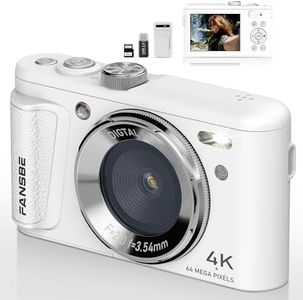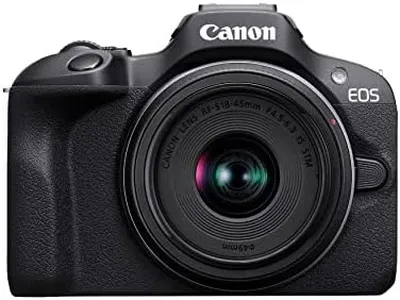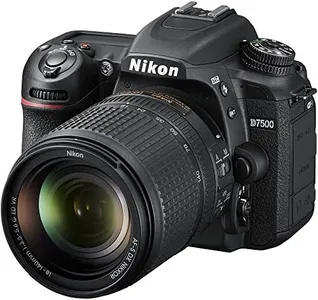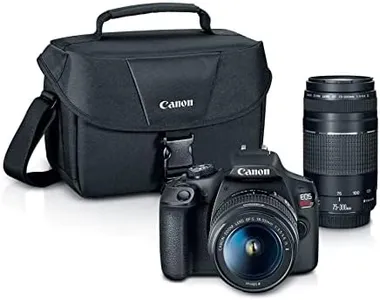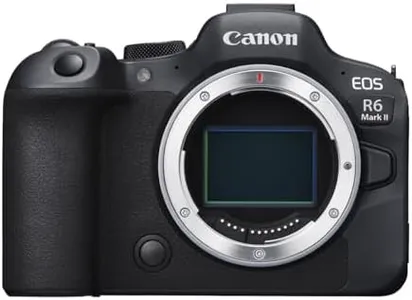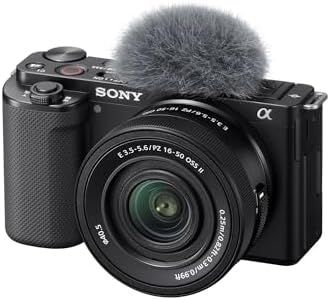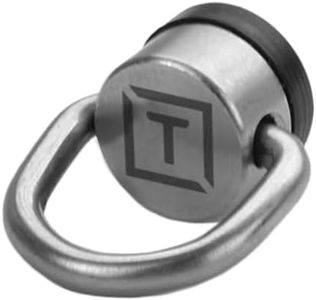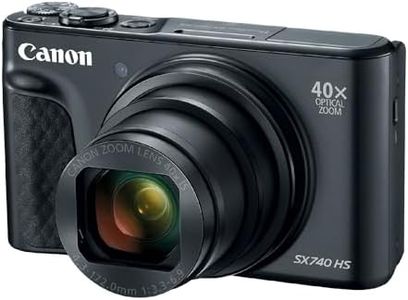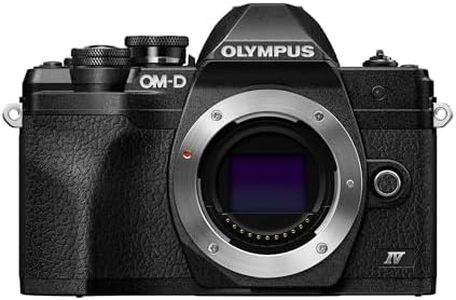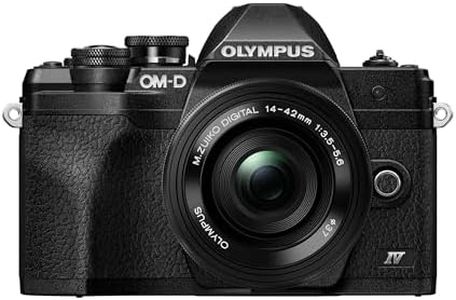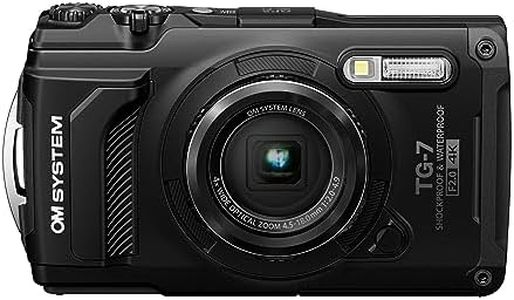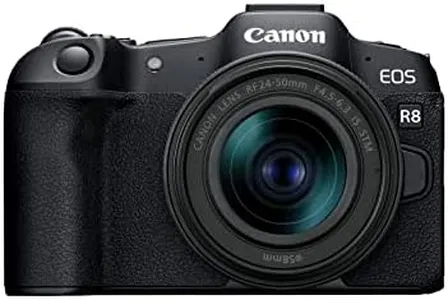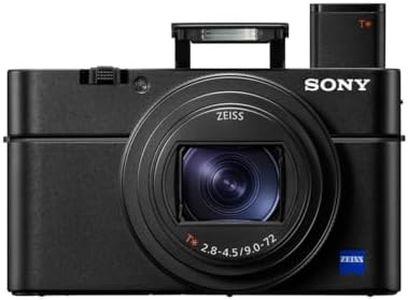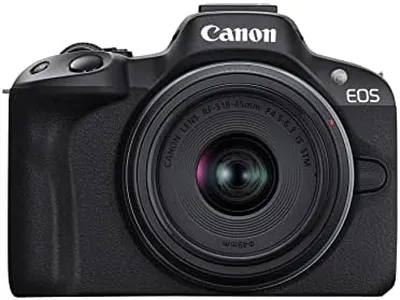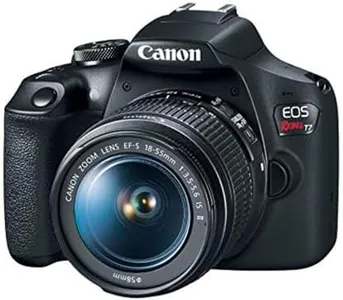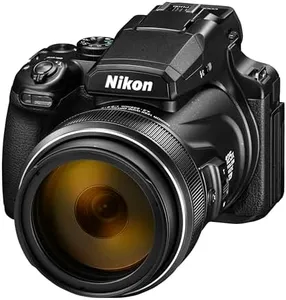10 Best Beginner Cameras 2025 in the United States
Our technology thoroughly searches through the online shopping world, reviewing hundreds of sites. We then process and analyze this information, updating in real-time to bring you the latest top-rated products. This way, you always get the best and most current options available.

Our Top Picks
Winner
Canon EOS R100 Mirrorless Camera RF-S18-45mm F4.5-6.3 is STM Lens Kit, 24.1 Megapixel CMOS (APS-C) Sensor, 4K Video, RF Mount, Black
Most important from
752 reviews
The Canon EOS R100 Mirrorless Camera is a great choice for beginners looking to step into the world of photography. One of its standout strengths is the 24.1 megapixel CMOS APS-C sensor, which delivers excellent image quality with great detail and natural bokeh. The camera's DIGIC 8 image processor supports 4K video recording and offers fast, high-quality shooting capabilities. Additionally, its compact and lightweight design makes it easy to carry around, ideal for those who are always on the go.
The RF-S18-45mm F4.5-6.3 IS STM lens included in the kit is versatile and provides good image stabilization, making it easier to capture clear images even in shaky conditions. The advanced autofocus system with 143 points and Dual Pixel CMOS AF covers a wide area and offers human face and eye detection, making it easier to focus on your subject. For video enthusiasts, the camera supports 4K recording at up to 24 frames per second and Full HD at up to 60 frames per second.
On the downside, the camera's fixed LCD screen may be a limitation for some users who are used to articulating screens for better viewing angles. Additionally, while the camera supports Bluetooth and Wi-Fi for connectivity, the absence of a remote control might be a drawback for those who prefer remote shooting options. Despite these minor drawbacks, the Canon EOS R100 offers a well-rounded package with excellent image quality, ease of use, and powerful features, making it a solid choice for beginners.
Most important from
752 reviews
Nikon D7500 20.9MP DSLR Camera with AF-S DX NIKKOR 18-140mm f/3.5-5.6G ED VR Lens, Black
Most important from
1683 reviews
The Nikon D7500 is a powerful DSLR camera that is suitable for beginners who are looking to step up their photography game. It offers a 20.9-megapixel sensor, which ensures high-quality images, and the included 18-140mm lens provides versatility for different types of photography. The camera's ease of use is enhanced by a large, tilting 3.2-inch LCD touchscreen, which makes navigating settings and reviewing photos straightforward, even for novices. The autofocus system, featuring 51 points with 15 cross-type sensors, is quick and accurate, making it easier to capture sharp images, even of moving subjects.
Additionally, the camera can shoot continuously at up to 8 frames per second, which is great for action photography. For video enthusiasts, the D7500 supports 4K Ultra HD recording and has various video features, including time-lapse. However, the camera's battery life, while decent, may require carrying a spare for extended shoots. Connectivity options such as Bluetooth and Wi-Fi make it simple to transfer photos to other devices.
While the camera is relatively lightweight for a DSLR, some beginners might find it a bit bulky compared to mirrorless options. The comprehensive range of automatic and manual settings provides flexibility for users to grow their skills. The D7500 is an excellent choice if you are serious about photography and want a camera that you can grow with, though it might have a steeper learning curve than simpler point-and-shoot models.
Most important from
1683 reviews
Canon EOS Rebel T7 DSLR Camera|2 Lens Kit with EF18-55mm + EF 75-300mm Lens, Black
Most important from
8191 reviews
The Canon EOS Rebel T7 DSLR is a solid choice for anyone just starting out in photography. It features a 24.1-megapixel APS-C sensor, which means you get sharp and detailed photos suitable for most everyday uses. The kit includes two versatile lenses—a standard 18-55mm for general shooting and a 75-300mm for zooming in on distant subjects—giving beginners flexibility to explore different styles. Autofocus is aided by a 9-point system and enhanced with Canon's Dual Pixel CMOS AF and eye detection, which helps keep subjects sharp in photos and videos, although it’s more basic compared to higher-end models.
The camera’s ease of use is boosted by various automatic shooting modes, making it friendly for newcomers who want quick results without fussing over settings. Video captures in full HD 1080p, suitable for casual recording, but it doesn't support 4K if that’s something you might want down the line. Battery life allows for about 500 shots per charge, which is decent for day trips or daily use. Connectivity options like built-in Wi-Fi and NFC let you easily share your images or use the camera as a high-quality webcam with software.
On the downside, the viewfinder covers around 95% of the scene, so you won’t see the entire frame through it, and the autofocus points are limited compared to more advanced cameras. The camera is somewhat bulky at around 3 pounds, which might feel heavy for younger users or casual shooters. This Canon suits amateur photographers who want a dependable DSLR that offers great image quality and basic video features, combined with user-friendly controls and decent connectivity. It balances performance and simplicity without overwhelming new users.
